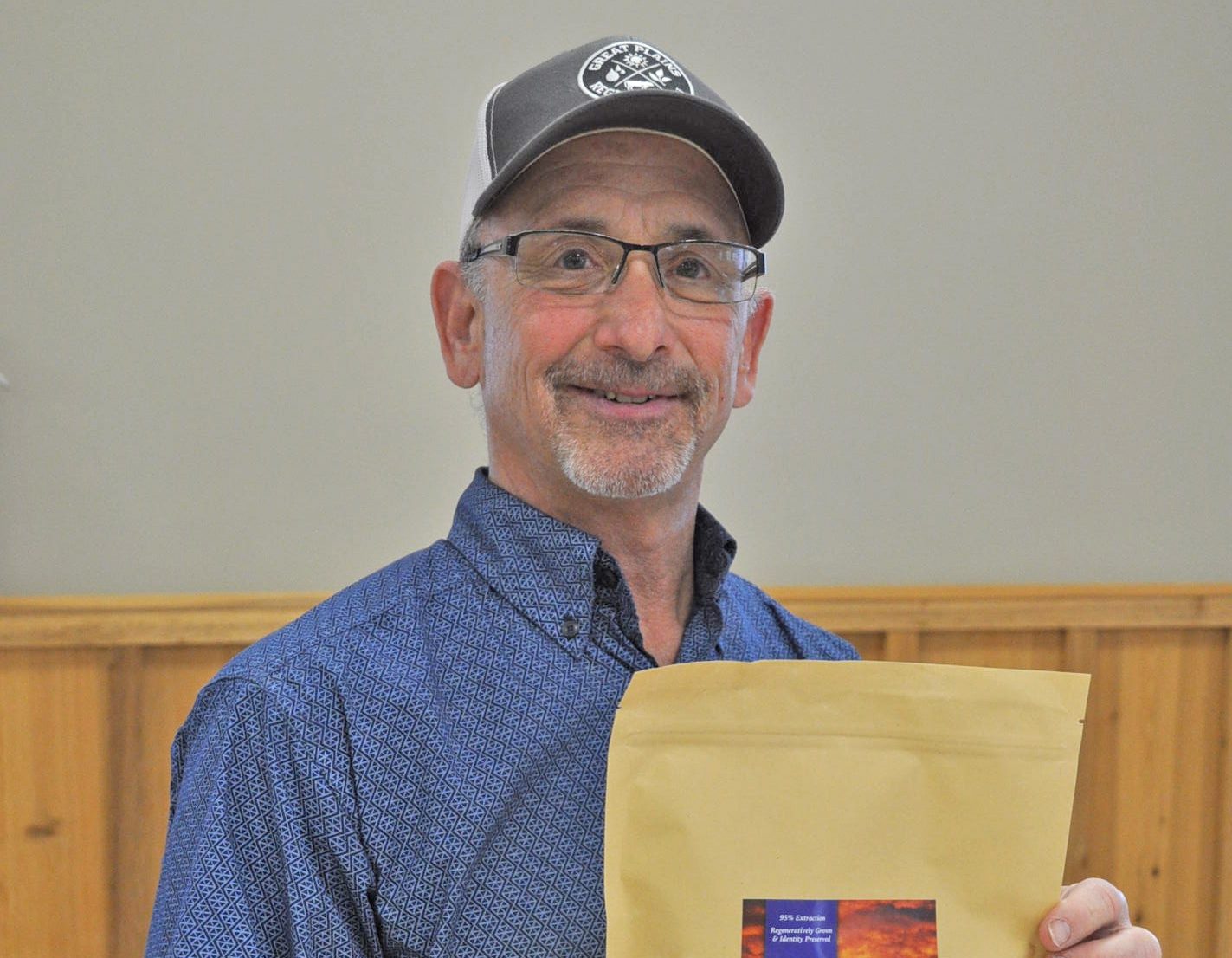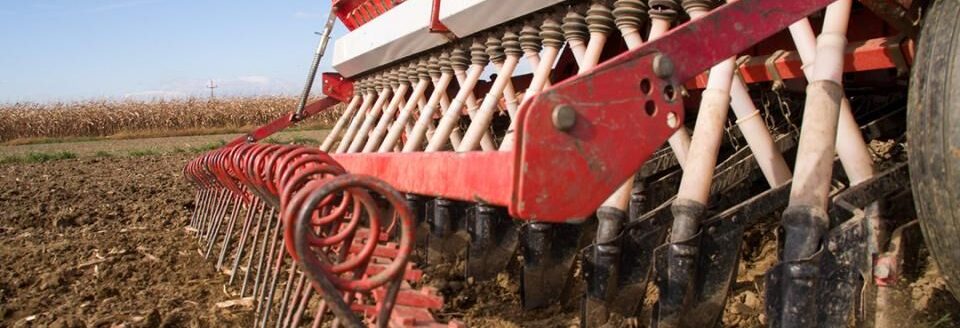When Steve DeWitt was experimenting with ingredients to make the perfect pancake mix, he immediately saw differences that brought to life the distinctive baking characteristics of individual wheat varieties.
“Butler’s Gold makes amazing flour,” he observed recently. “When I tested it in pancakes, they would get three-quarters-of-an inch tall. It’s such a strong flour, a strong dough.”
As founder and owner of Willow Creek Farms Pantry, DeWitt sells 3-pound bags of stoneground flour made from two Oklahoma State University wheat varieties, Butler’s Gold and Big Country, a hard white wheat. He also grows and mills Turkey Red, the ancestral grain brought from Russia to the Central Plains by Mennonite immigrants 150 years ago.
In the picture above taken by Candace Krebs, DeWitt shows stoneground flour made from Oklahoma State University wheat varieties Butler’s Gold and Big Country, as well as a pancake and waffle mix.
Some of his customers are finding Butler’s Gold flour ideal for pizza crust. Others have used it to make the dark-colored “Bushman bread” popularized by Outback Steakhouse chain. A small pasta shop in Wichita raved about the results.
Big Country makes exceptional flour too. The light bran and buttery, sweet flavor complement the nutty robustness of Turkey Red in DeWitt’s newest product, a dry-bagged heritage pancake and waffle mix. It’s the first exclusively Made-in-Oklahoma product distributed by Oklahoma-based DJ’s Fundraising, alongside sausage, bacon, chicken strips and other food items. Sales of the product have been used to benefit FFA chapters across Oklahoma, Kansas, Colorado and New Mexico.
From farm to flour
DeWitt’s increasing familiarity with the intricacies of flour is something he never anticipated while growing up on the family farm near Braman in north central Oklahoma. Only in recent years did he become interested in marketing his own homegrown grain in a minimally processed form.
He admits he didn’t think much about the connection between soil health, food quality and human health until he started attending conservation tillage conferences in the region.
“The no-till movement has grown beyond no-till to soil health and regenerative practices. It’s all evolved together,” he said.
Several years ago, he joined a nonprofit called Great Plains Regeneration, which sought to shorten the supply chain from field to fork and make whole grain flour available to more customers. The group explored several custom milling possibilities, including at Panhandle Milling near Hereford, Texas, but found processing and shipping costs prohibitive.
Then, in 2021, Enid entrepreneur Brady Sidwell launched Chisholm Trail Milling Company by bringing in two hand-crafted artisan stone mills.
With a milling venture now just 80 miles away, DeWitt saw an opportunity.
“When the project I was working on with Great Plains Regeneration didn’t pan out, I got in contact with Brady Sidwell,” he said. “His willingness to do some ‘toll’ milling for me was the key to my getting started. I probably would not have done it otherwise.”
Since one horizontal stone mill and sifter box can cost as much as $25,000, commercial milling equipment is unaffordable for most small-scale marketers like him, DeWitt said.
In addition, without a commercial kitchen of his own, he also needed a co-packer to expand into dry mixes. Eventually he found Deep Fork Foods, an award-winning condiment and snack company specializing in spices and sauces. He uses the same co-packer, located at an eastern Oklahoma pecan orchard, to bring in authentic Vermont maple syrup in bulk and individually heat, package and label it.
DeWitt sells his products through an online store, but the bulk of sales are to what he calls “year-round farmers market stores” focused on local sourcing. Oklahoma City and Tulsa have several, but others have sprouted up in smaller towns like Arcadia, New Castle, Piedmont and Deer Creek.
This spring he promoted his products at a large regional farmers market in Caldwell, hosted by Shop Kansas Farms, an outreach of Kansas Farm Bureau. The event coincided with formation of the Border Queen Harvest Hub, a community engagement effort aimed at promoting items produced on farms in southern Kansas and northern Oklahoma.
“I think there’s more interest all the time in products like mine, especially as more small markets and market hubs like these develop,” DeWitt said.
Small but growing
DeWitt estimates over the past year he direct-marketed the equivalent of roughly four acres of production, but expects to double that in 2024.
“Per acre, it’s much more profitable than anything else on my farm,” he said. “But it’s low volume. It’s hard to do enough volume with something like this to have a livelihood.”
“I knew starting out it wouldn’t be a way to market all the farm’s production,” he added. “The volume is growing, but it’s a slow process. If you’re a 2,000 or 3,000-acre farmer, you’ve got to be in the commodity market. But, with a sideline like this, you might be able to bring a child back to the farm with the extra income stream.”
DeWitt’s dad, Garold, is actively farming at age 81. DeWitt has coupled his work on the farm with a successful career in agribusiness, currently working for Koch Industries. His sons have multiple interests, but grew up working on the farm and share an appreciation for land stewardship and healthy food.
Dane, the oldest, is a mechanical engineer in Ponca City but lives on one of the family’s farms. Drew is a technician with P&K Equipment at Edmond. Dylan, currently a student at Northern Oklahoma College in Tonkawa, plans to eventually transfer to OSU. He works for Helena Chemical.
They all share ownership in the family cowherd.
“I don’t know if my boys will have the opportunity to be full-time farmers,” DeWitt reflects. “But if they can be part-time farmers, with a value-added business like this as part of their enterprises, they’ll be able to stay involved in agriculture.”
It’s not an easy path getting identity-preserved, minimally processed food to consumers at an affordable price, he said.
One limitation is lack of population in rural areas, another is lack of processing and distribution.
Still, the market is changing, and DeWitt sees potential in new directions pursued by OSU’s chief wheat geneticist and distinguished professor Dr. Brett Carver, who leads the wheat breeding program. He’s been carefully following varietal advances for years, looking for options that combine good yield potential with environmental adaptability and desirable baking characteristics.
An experimental plot 25 miles from his home allows him to evaluate varieties side-by-side in the field on land provided by Ponca City-area seed grower and research cooperator Don Schieber.
Schieber’s annual spring field day is scheduled for 8 a.m. May 13. A full schedule of upcoming test plot tours is posted online by the Oklahoma Wheat Commission at OKWheat.org.
“Having a public wheat breeding program gives us great access to new varieties,” DeWitt said. “Since OSU conducts test plots in our growing area, we can see how the varieties perform right where we live.”
Carver is now in the process of breeding wheat with innovative consumer-health traits, including purple antioxidants, high fiber content and slower digesting carbohydrates. A new genetic line with enhanced protein strength and functionality is also undergoing testing in large-scale bakery trials.
“If these varieties bring higher value for the miller and baker, then hopefully at some point the farmer can share in that,” DeWitt said. “And maybe it will bring a resurgence of interest in utilizing locally grown wheat by our regional mills.”
Beyond wheat
DeWitt wants to expand into value-added opportunities beyond wheat. He’s applied for a grant through the U.S. Department of Agriculture’s Resilient Food Systems Infrastructure program, which is administered by state agriculture departments, to construct a co-packing facility dedicated exclusively to gluten-free milling and packaging.
“If I wanted to develop a sorghum flour pancake mix with my own sorghum, there’s no place to go right now to have that done,” he said. “I think it would be great to offer a frozen gluten-free waffle with no sugar added.”
He’s also continuing to fine-tune his approach to soil health. In addition to rotating crops and grazing cover crops, he’s experimenting with using biological products to reduce the need for chemical fertilizer and pesticides.
“Last fall I didn’t apply any nitrogen. Instead, I used compost extract on the seed and didn’t see any negative impact,” he explains. “One of the big differences I’ve noticed when using biologicals is more root mass and early root growth. If you pull up a plant, there are no bare roots and lots of soil still attached.”
That’s an indication of increased nutrient exchange with soil microbes.
“I think a lot of our soils, mine included, are bacterial dominant,” he added. “By using the compost extract, you get more of the fungal component, which improves the fungal-to-bacterial ratio.”
He currently gets the extract from Fed N Happy, a company based at Hutchinson, Kansas.
Candace Krebs is with OKGenetics.com.




